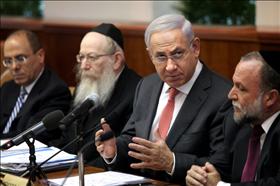The Votes are In
Hiddush’s Annual Israel Religion and State Index 2011
80% of the Jewish population is dissatisfied with how the government handles issues of religion and state. 83% support the full realization of religious freedom and equality. 62% support civil and non-Orthodox marriages; the majority of the public also support recognition of same-sex marriages. 85% of the non-ultra-Orthodox population support reducing funding for yeshivas.
03/10/2011 10:53
Tags: Hiddush Reports · Polls · Civil Marriage · Army Exemptions · Core Curriculum · Workforce · Who is a Jew

Prime Minister Benjamin Netanyahu at the weekly cabinet meeting. To his right, Deputy Finance Minister Yitzhak Cohen from Shas. His left hand, Deputy Health Minister Yaakov Litzman from United Torah Judaism, 28.08.2011. Photograph by: Flash 90.
To see the full report, click here
These figures reflect some of the highlights of the 2011 Israel Religion and State Index, which was carried out in the midst of a tense social-economic protest which swept the country and focused primarily on the cost of housing and living; even so, 64% of the respondents view the tension between secular and ultra-Orthodox as the most [or second most] acute domestic conflict in Israel. Only 30% view the tension between rich and poor as such.
The study reaffirmed that the majority of Israelis support freedom of choice in marriage: 62% of the Jewish population support recognition of all forms of marriage, including Conservative, Reform and civil; 91% of the secular population supports this right. This stands in stark contrast to the existing situation in Israel where only Orthodox marriages can be legally performed for Jews, and civil marriage is not a legal option; whoever is deemed ineligible for marriage by the Orthodox rabbinate [all non-Orthodox converts to Judaism, hundreds of thousands of immigrants from the former Soviet Union etc.] or wishes to marry differently must do so outside the country’s borders. Similarly, 61% of the Jewish public supports equal recognition of conversions of all streams of Judaism.
Hiddush President Rabbi Uri Regev reacted to the findings saying “The public has expressed its total lack of confidence in the government’s surrender to ultra-Orthodox in return for their votes, and want to see the realization of full freedom of religion and conscience. The findings unequivocally show that the public understands that without either military or national service by the ultra-Orthodox population as well as without ultra-Orthodox participation in the work force – Israel’s security will be in jeopardy, the economy will stall, and there will be neither communal sharing of civic duties nor social justice.” 61% of ultra-Orthodox men of working age do not work, opting rather to study full time in yeshivas with funding from public coffers.
There is a vital need for Diaspora Jewry to understand these key challenges facing Israel, and partner with their Israeli counterparts such as Hiddush in helping Israel fully realize the core values of religious freedom and equality --Hiddush Chairman Stanley Gold
The Israel Religion and State Index is an annual study conducted by the Smith Institute for Hiddush-Freedom of Religion in Israel, Inc. The research is based on a large sample of 800 people representing the adult Jewish population of Israel. It was conducted between August 16-22, 2011.
Hiddush Chairman Stanley P. Gold, community leader, philanthropist and investor in Israeli economy, stressed that “There is a vital need for Diaspora Jewry to understand these key challenges facing Israel, and partner with their Israeli counterparts such as Hiddush in helping Israel fully realize the core values of religious freedom and equality.” “Moreover”’, said Gold, “the study reconfirms the direct link between these values, aimed at ensuring Israel’s future as a Jewish and democratic state, and the desire to strengthen Israel’s economy.”
Half of non-ultra-Orthodox women (47%) said that they would not be willing even to board a publicly segregated bus where women are relegated to the back. In Israel today, approximately 70 segregated public bus lines operate throughout the country offering over 2,500 rides per day. Women who refuse to sit in the back of the bus often face harassment and violence on these lines. Non-ultra-Orthodox men responded that they believed only 29% of non-ultra-Orthodox women would not be willing to board these buses, indicating a significant gap in perception between the two genders regarding how threatened women feel by these bus lines.

Soldiers from the Netzach Yehuda unit finishing a military hike of 40 km. 16.2.10, Avir Soltan, Flash 90
63% of the Jewish public support operating public transportation on Shabbat. 27% support full operation of bus lines, 36% support partial running (less frequency, fewer lines). This 63% is a significant increase compared to the 58% in the winter of 2010. Today there is hardly any public transportation on Shabbat for Jews except in Haifa and some shared taxi services. Among the secular Jewish population, 93% support public transportation on Shabbat and support from new immigrants is 90%.
The Religion and State Index reveals that nearly the whole of the non-ultra-Orthodox public supports mandatory military or civil service for the ultra-Orthodox. 85% of the non-ultra-Orthodox population (79% of the total Jewish population) support reducing state funding for both yeshivas and large families in order to encourage ultra-Orthodox men to enter the workforce. This is an increase of 4% as compared to 2010 and 8% as compared to 2009. 85% of the non-ultra-Orthodox population also holds that ultra-Orthodox educational institutions should be obligated to implement core curriculum including math, sciences, English and civics.
These findings clearly demonstrate the public’s support for pluralism and religious freedom, which is further underscored by a poll recently commissioned by the Israeli Ministry of Public Diplomacy and Diaspora Affairs which showed that 63% of Israeli Jewish public views as Jews those converted by Reform and Conservative rabbis (see Hebrew here). Unfortunately, given the participation of the ultra-Orthodox parties in the government coalition, it is unlikely that without outside pressure PM Netanyahu will heed to the public will.
Further context and background to the strong rejection by the public of the Government’s current policies can be found in the Israel Democracy Index released last week by Israel Democracy Institute. It included for the first time a comparative table on freedom of religion, in which Israel ranks in the lowest category of the scale with a grade of “0”, along with Egypt, Syria, China and Saudi Arabia.
To see Ynet's coverage of Hiddush's research, click here